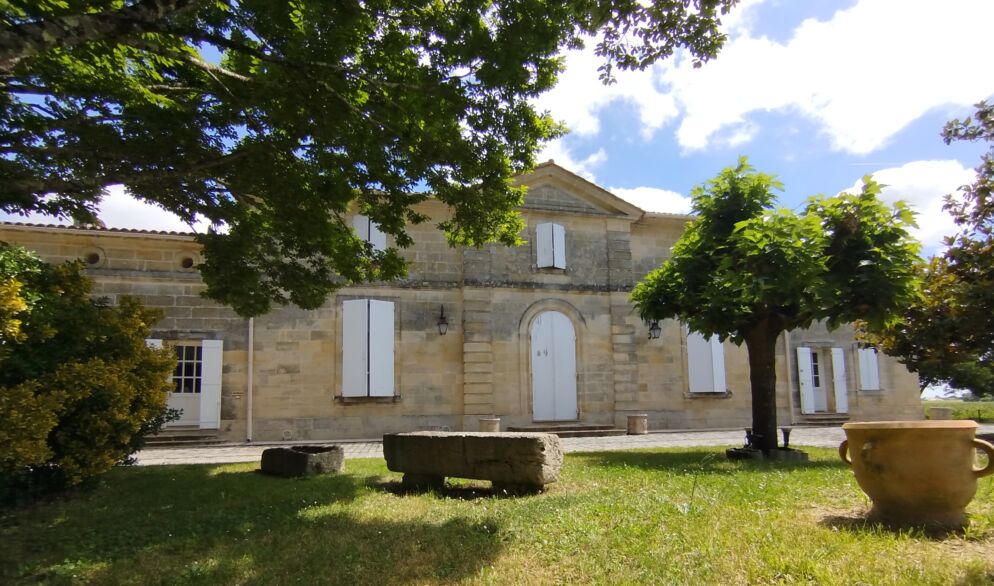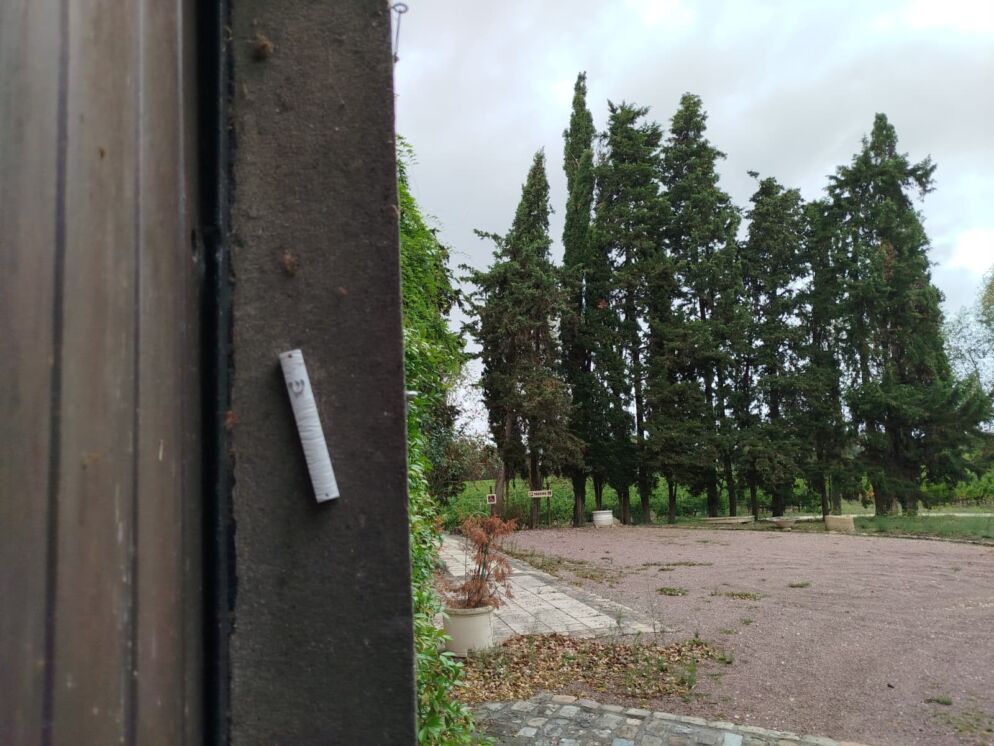 (Courtesy of Rabbi Mendel Bitton)
(Courtesy of Rabbi Mendel Bitton)
Jules Polonetsky
Kosher wines produced in the Bordeaux region of France are currently widely available. Even a few of the elite wineries will make an annual kosher production. One winery, Domaine Roses Camille, has had so much success selling its wines to the kosher market at a premium price that it makes all of its wines kosher. Now, for the first time in Bordeaux, a fully kosher winery has launched.
Château Jupille Carillon is a well-regarded Saint-Émilion winery, producing supple, Merlot-driven wines from its clay-limestone slopes. It recently relaunched under Orthodox Jewish ownership and has been fully converted into a kosher winery, with mezuzot on the doorposts and Sabbath-observant staff in the cellar. This is not just a “kosher run,” the occasional arrangement where a Bordeaux estate sets aside barrels for a kosher label. Jupille Carillon is now fully kosher, from vineyard to bottling.
 A mezuzah on the doorpost. (Courtesy of Rabbi Mendel Bitton)
A mezuzah on the doorpost. (Courtesy of Rabbi Mendel Bitton)
Its transformation tells a larger story about French wine’s economic challenges, the growing sophistication of kosher wine drinkers and a new effort to bridge Jewish and French wine traditions.
The backdrop is the crisis shaking the French wine world. Domestic consumption keeps falling, especially among younger generations, who increasingly reach for beer, cocktails, or spirits. Retailers push prices down, squeezing small family producers. For the Visage family, longtime owners of Jupille Carillon, that pressure — and a lack of heirs interested in continuing — led them to sell.
Enter the PRYMAC Group, a consortium of Orthodox Jewish investors active in kosher food and hospitality ventures. Through its new arm, PRYMAC Wine, the group bought the estate in late 2024 with an unusual mission: to produce world-class Bordeaux that is both authentically French and rigorously kosher, while making quality wine more accessible to Jewish consumers around the world.
The Rabbi as Winemaker
At the helm is Rabbi Mendel Bitton, a Montreal-born rabbi who received ordination in 2004 and has spent two decades in kosher wine supervision. Because halacha (Jewish law) requires that only Sabbath-observant Jews handle wine once grapes reach the cellar, mashgichim (kosher supervisors) often end up directly involved in winemaking. In Bitton’s case, it made him a winemaker.
“I’ve worked with kosher wine for 20 years,” he said. “When you spend your days with oenologists and vineyard managers, you learn. That’s how I became a winemaker.”
Bitton now oversees all key decisions such as harvest timing, fermentation and blending, while working closely with the estate’s longtime oenologist and vineyard manager. The terroir remains classic Saint-Émilion: predominantly Merlot with some Cabernet Franc. “We wanted to preserve the identity of the wine,” Bitton said, “but invest where it can make a real difference.”
One such investment is an advanced grape-sorting system that immerses fruit in a sugar-water solution calibrated to separate sound berries from underripe ones or debris. It improves precision and, as a bonus, helps address minor kosher concerns about insects.
The result, Bitton hopes, will be wines that are recognizably Jupille Carillon: supple, ruby-colored and polished, but now even more consistent.
Kosher From the Ground Up
Unlike most kosher Bordeaux projects that require temporary conversion and parallel staffing for kosher productions, Jupille Carillon was kashered once at purchase and has remained kosher ever since. Every tank, pump and barrel is permanently dedicated. “We had to make it kosher only once,” Bitton explained. “From then on, everything stays kosher.”
That permanence opens another door to meeting the strictest expectations of some ultra-Orthodox consumers who want assurance that non-Jews have not handled or even seen the wine after harvest. “This year, we are going to make one production for this kind of very Orthodox requirement,” Bitton said. What would be awkward or impossible in a shared facility is manageable in a fully kosher estate.
The 2025 harvest marked the first kosher vintage, now maturing in barrels. Bottling is planned before Passover 2026, with U.S. and Israeli releases to follow by Rosh Hashanah. Distribution models are still being finalized, but the aim is to sell directly to consumers where possible, bypassing layers of intermediaries that typically inflate kosher wine prices.
“We don’t want good kosher Bordeaux to be a luxury,” Bitton insisted. “In France, people can buy excellent wine at modest prices. Jewish consumers deserve the same access.”
The château’s reinvention extends beyond the cellar. Bordeaux has long posed challenges for kosher travelers, as few wineries can offer tastings, and most kosher bottlings are exported immediately. Jupille Carillon plans to change that. The estate will welcome visitors for vineyard walks, tastings and simple kosher meals, with plans for a seasonal restaurant and renovated guest rooms for overnight stays. Mezuzot already mark the doors.
“Our goal,” said Bitton, “is to offer the same experience you find at many Bordeaux estates with tour, tasting and a meal, but fully kosher.”
That vision resonates with Jewish wine tour organizers such as Zev Steinberg, whose “Wine with Zev” trips through Bordeaux have included stops at Domain Roses Camille and other high-end kosher producers. Steinberg recently added Jupille Carillon to his itinerary, calling its barrel tasting “a highlight” of his latest tour.
Education is another cornerstone of PRYMAC’s mission. “In France, everyone knows about terroir and vintage,” Bitton said. “In the kosher world, people are just starting to learn.
They’re more curious than ever but not yet educated.” He hopes to change that through affordable pricing, social media outreach on platforms like TikTok and YouTube, and, of course, immersive wine tourism.
“Wine is a big part of Jewish culture, and also of French culture,” he added. “It’s natural to build a bridge between them.”
L’Chaim!
Jules Polonetsky is a wine and spirits education trust level 3 certified wine expert who edits a wine education website at kosher-wine.org. He is a former consumers affairs commissioner for New York City.

Dining and Cooking